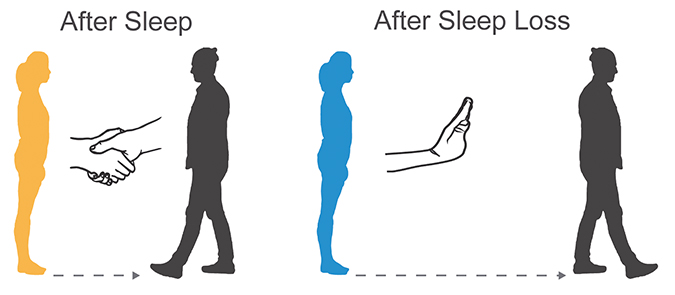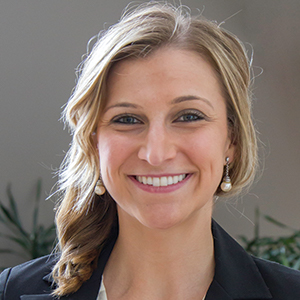Pulse points
From their labs to their personal lives, scientists now are addressing wellness and working to raise awareness about mental health issues. Here we offer links to work in this area, including a study on how sleep deprivation can lead to loneliness, an initiative to improve heart health and research on worms under extreme stress.
Out of the dark
Susanna Harris is a graduate student studying microbiology at the University of North Carolina School of Medicine. Last summer, she gave a talk for The Monti, a series of live shows in which guests share personal stories. In her talk, she shared her experience with depression after failing an exam in graduate school and how she came through the other side of what she described as “months of crushing darkness.” Watch her video and follow her on Twitter.
Stressed worms

Researchers funded by the National Institutes of Health investigated the impact that environmental stress can have on the nervous systems of roundworms called Caenorhabditis elegans. A news release from the NIH explained that when C. elegans are exposed to a stressor, such as starvation, they stop developing temporarily and then continue growing after the stressful situation has passed. Researchers studying worms before and after a period of stress concluded that stress rewired the worms’ nervous systems.
Shunned and sleepless
Researchers at the University of California, Berkeley, demonstrated that sleep-deprived people not only feel lonelier, but also alienate others. Matthew Walker told Berkeley News: “The less sleep you get, the less you want to socially interact. In turn, other people perceive you as more socially repulsive, further increasing the grave social-isolation impact of sleep loss.” The team used brain imaging, simulations and other tools to measure the social implications of poor sleep.
 COURTESY OF MATTHEW WALKER AND ETI BEN SIMON
COURTESY OF MATTHEW WALKER AND ETI BEN SIMON Feel like a fraud?
Julia Omotade, Jamie King and Richard A. Kahn wrote in this magazine in February 2017 that the term “imposter syndrome” is used “to describe the chronic and potentially lifelong feelings of inadequacy and self-doubt that affect performance and professional outcomes.” Have you experienced these feelings in your educational or professional career? If so, you’re not alone and there are ways to overcome them. Elizabeth Cox answers the question “What is imposter syndrome and how can you combat it?” in a TED-Ed animation.
Pulse points: Healthy hearts

Researchers at the Centers for Disease Control and Prevention and Agency for Healthcare Research and Quality project that there will be about 16.3 million cardiovascular events and upwards of $173.7 billion in hospitalization costs between 2017 and 2021 if interventions in clinical settings and communities are not implemented. For those reasons and others, the CDC and Centers for Medicare & Medicaid Services launded the Million Hearts initiative. The initiative brings together state and federal agencies and private-sector partners to prevent 1 million cardiovascular events by 2022. Read it here.
Enjoy reading ASBMB Today?
Become a member to receive the print edition four times a year and the digital edition monthly.
Learn moreFeatured jobs
from the ASBMB career center
Get the latest from ASBMB Today
Enter your email address, and we’ll send you a weekly email with recent articles, interviews and more.
Latest in Careers
Careers highlights or most popular articles

Sketching, scribbling and scicomm
Graduate student Ari Paiz describes how her love of science and art blend to make her an effective science communicator.

Embrace your neurodivergence and flourish in college
This guide offers practical advice on setting yourself up for success — learn how to leverage campus resources, work with professors and embrace your strengths.

Upcoming opportunities
Apply for the ASBMB Interactive Mentoring Activities for Grantsmanship Enhancement grant writing workshop by April 15.

Quieting the static: Building inclusive STEM classrooms
Christin Monroe, an assistant professor of chemistry at Landmark College, offers practical tips to help educators make their classrooms more accessible to neurodivergent scientists.

Unraveling oncogenesis: What makes cancer tick?
Learn about the ASBMB 2025 symposium on oncogenic hubs: chromatin regulatory and transcriptional complexes in cancer.

Exploring lipid metabolism: A journey through time and innovation
Recent lipid metabolism research has unveiled critical insights into lipid–protein interactions, offering potential therapeutic targets for metabolic and neurodegenerative diseases. Check out the latest in lipid science at the ASBMB annual meeting.

